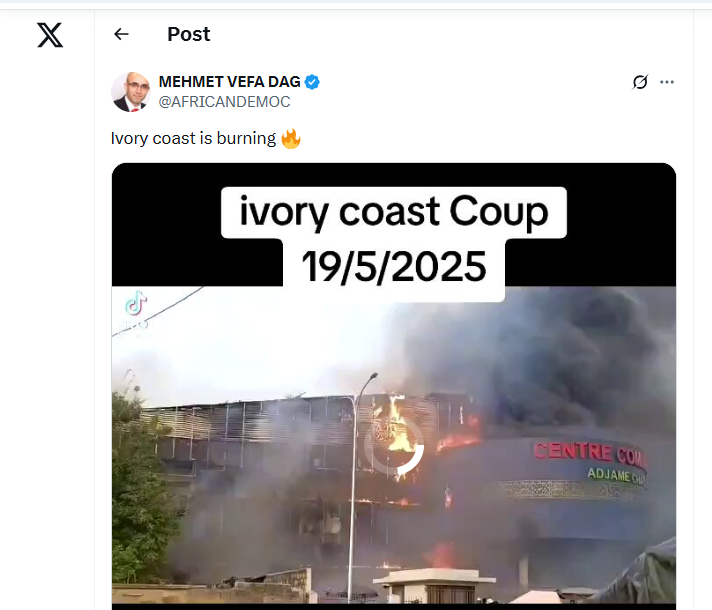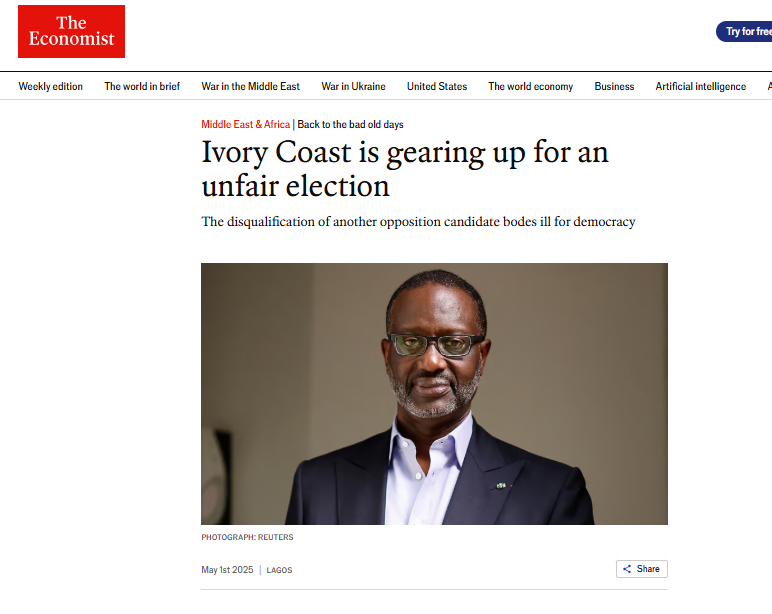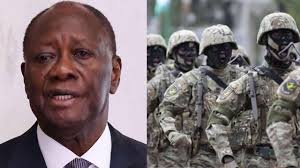By Toheeb Omotayo
Widespread rumors of a military coup in Ivory Coast have been stoked by recent social media posts, especially on X (formerly Twitter), which detailed reports of persistent gunfire in Abidjan, internet and media outages, and even the death or disappearance of President Alassane Ouattara.
While these reports have sparked public concern, as of May 23, 2025, there has been no credible evidence supporting these claims. Instead, the unrest rumors are perceived to stem from underlying political tensions and regional dynamics, amplified by misinformation.
Reacting to the rumors, however, the Government of Ivory Coast made a confirmation post of stability on May 21, 2025, which debunked the claims of a coup or widespread unrest in the country as unfounded.
The post, supported by an official statement and photographs, showed President Ouattara chairing a council of ministers meeting at the presidential palace in Abidjan. This directly refutes claims of his death, detention, or disappearance.
An Ivorian journalist, Christelle Kouamé, also a member of the National Union of Journalists of Côte d’Ivoire, clarified the rumors, saying, “There is no coup in Côte d’Ivoire. The country is stable.” She highlighted Ouattara’s recent public appearances at the Africa CEO Forum.
Meanwhile, major international news outlets, such as BBC, Reuters, and France24, have not reported any coup or significant unrest as of May 23, 2025. Their coverage has mainly focused on the Ivory Coast’s upcoming October 2025 presidential election and economic developments.
Posts on X claiming over 33 deaths, internet outages, and a media blackout are proven to lack verifiable evidence. Some users have flagged these as fake or satirical, with one post clarifying that a trending video of a fire was from an unrelated accident.

The viral video, posted by an X user @AFRICANDEMOC, with a caption that read: “Ivory cost coup. 19/05/ 2025. Ivory coast is burning. Alasana Qutara is nowhere to be found”, has generated quite a wave of tension. Findings by The FactCheckHub revealed that the video showed a widely reported fire incident that happened in Ivory Coast on February 5, 2025.
Although posts by the government confirmed that the country is not experiencing a coup or civil war, the rapid spread of these rumors points to real underlying tensions that make such claims believable.
The Real Causes of Tension in Ivory Coast

While there is no coup, Ivory Coast is grappling with political and social pressures that fuel public anxiety and provide a wide space for misinformation to spread. The October 2025 presidential election is a major source of unease. President Ouattara, in power since 2010, has not confirmed whether he will seek a fourth term, which would be constitutionally controversial. His third term in 2020 already sparked protests and violence, though less severe compared to the 2010–2011 civil war that killed 3,000 people after former President Laurent Gbagbo refused to concede defeat.
Similarly, the disqualification of opposition leader Tidjane Thiam, former Credit Suisse CEO and head of the Democratic Party of Côte d’Ivoire (PDCI), has also heightened tensions. On April 22, 2025, an Abidjan court ruled Thiam ineligible to run due to his former dual Ivorian-French citizenship, despite his renunciation of French nationality in February 2025. This decision, which cannot be appealed, led to protests in Abidjan and Bouaké on April 24, 2025, met with police blockades and tear gas.
Other opposition figures, like former President Laurent Gbagbo, face eligibility questions due to his role in the 2010 crisis, despite his acquittal by the International Criminal Court and a presidential pardon. These exclusions raise fears of an unfair electoral process, deepening public disillusionment, especially among youth.
On the regional instability and the “Coup Belt” context, West Africa’s recent wave of coups—in Mali (2020, 2021), Burkina Faso (2022), Niger (2023), and Guinea (2021)—has created a regional atmosphere of instability, making coup rumors in Ivory Coast more believable. For example, Burkina Faso accused Ivory Coast of harboring coup plotters in 2023, straining relations..
Not Only Political and Regional Instability – Economic and Social Grievances Are Key Drivers
Despite the Ivory Coast’s strong economic growth, averaging over 6% annually, driven by cocoa, gold, oil, and gas exports, youth unemployment remains high at 20% (World Bank, 2024). This fuels frustration among the 75% of Ivorians under 35, who are susceptible to anti-establishment narratives.
According to Afrobarometer (2021), 65% of Ivorians feel marginalized by political elites, and 60.3% believe the government must do more to fight corruption. These sentiments amplify distrust and make rumors of unrest more believable.
Misinformation is No Exemption
The cause of the unrest also extends to misinformation and social media amplification. Social media platforms like X are key drivers of false narratives. A 2023 Africa Center for Strategic Studies report found that 60% of coup-related misinformation in West Africa originates online, with 80% lacking evidence. Only 40% of Ivorians have internet access (ITU, 2024), yet unverified posts spread rapidly, exploiting public fears.
Some X posts suggest foreign interference, particularly from France, as a cause of unrest rumors, reflecting historical sensitivities about colonial influence. However, these claims remain speculative without evidence.
The Impact of These Tensions and the Way Out
Even without a coup, the combination of political uncertainty and misinformation has significant consequences. The rumors of a coup in Ivory Coast are false, driven by unverified social media posts rather than reality. However, they reflect real tensions: political uncertainty around the 2025 election, regional instability, economic grievances, and low media literacy.
By debunking misinformation, fostering transparency, and addressing structural issues like unemployment and electoral fairness, the Ivory Coast can strengthen its stability and resilience. As citizens, it is important to verify information before sharing and rely on trusted sources to build a more informed society.
Toheeb Omotayo is a Nigerian-based writer. He can be reached via: toheebomotayo12@gmail.com

